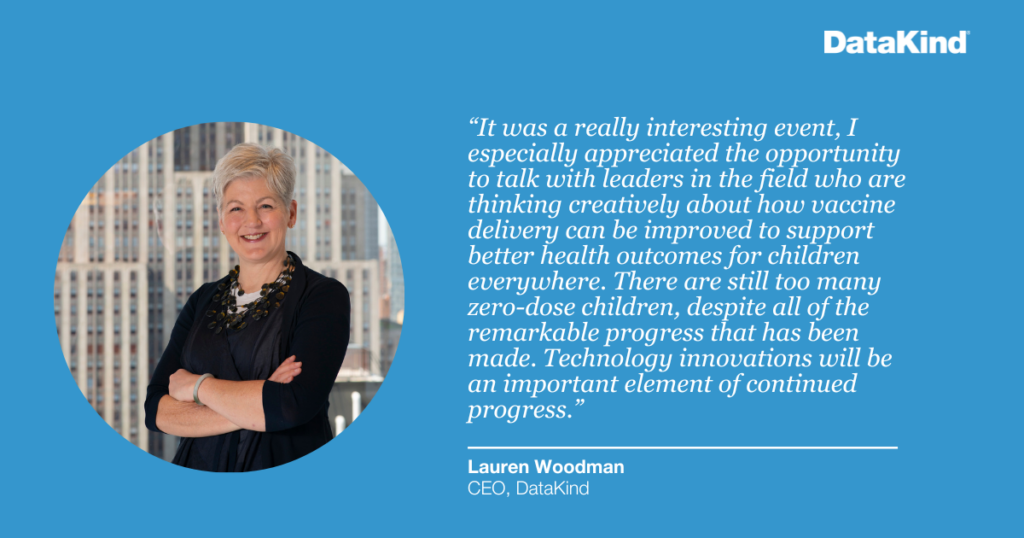Yesterday, DataKind CEO, Lauren Woodman, attended a side event with GAVI, the Vaccine Alliance, during the World Economic Forum’s Annual Meeting in Davos, Switzerland, on how innovation, specifically AI and better use of data, can support and advance the important work of vaccination all over the world.

Vaccine deployment is a field that stands to massively benefit from data science interventions, and DataKind is well-positioned to support these, bringing a decade of experience in frontline healthcare, for example, using mobile technology to preserve vaccines as far back as 2013. From AI-informed route optimization for vaccine supply delivery and increasing risk management capacity in the supply chain, to storage temperature monitoring and dynamic cooling, to managing vaccine hesitancy, the possibilities are numerous, and the stakes could not be higher.
Vaccines prevent tens of millions of deaths each year, and offer protection against more than 20 life threatening diseases globally. The measles vaccine alone prevented more than 23 million deaths worldwide from 2000-2018, and GAVI-supported health systems have prevented more than 17 million deaths of children in low- and middle-income countries. Unfortunately, many of these gains have been eroded over the past five years. COVID-19 resulted in a massive decline in childhood vaccinations, the lowest rates in three decades, and vaccine skepticism is on the rise all over the world.
Data-driven approaches can help identify positive demand responses to awareness campaigns and policy, as well as identify potential sources of vaccine hesitancy; in both cases, this information can inform vaccination campaign decisions.
Figure 1: Continuum of vaccine acceptance sourced from UNICEF’s Vaccine Messaging Guide
The problems are clear: Inadequate healthcare resources, a shortage of trained workers, a lack of affordable access, discrimination-related barriers, as well as global issues such as political conflict, wars, and climate change compound these challenges, hindering equitable vaccine deployment. AI solutions can provide a critical pathway, and algorithms are already being used to optimize distribution and forecasting, while monitoring systems and sensors ensure real-time oversight of the vaccine cold chain.
Initiatives around data science and AI must be a joint effort between subject matter experts (e.g. community health workers), policymakers, communities, and technical contributors to ensure the right challenges are being addressed with the appropriate solutions. Implementing these solutions will require a coalition of health organizations, government, civil society, and the private sector, among others. DataKind is well positioned to support many of these needs, particularly in strengthening both information and healthcare systems, and supporting the healthcare workforce who are the frontlines of vaccine implementation.
One example: By analyzing a rolling average of disease incidents and other variables, these models can forecast increases in vaccination demand, which can in turn predict appointments. This empowers healthcare providers to adjust staffing based on anticipated workloads, optimizing worker efficiency while also ensuring adequate patient care and minimal wait times. Many health institutions in the US are looking to generative AI to streamline their daily workflows, increase productivity, and help healthcare providers to focus on helping their patients, rather than data entry, maintenance, and data analysis.
DataKind’s tool for systematically improving data quality is one such tool. In cooperation with globally distributed frontline health partners, Ministries of Health, frontline health workers, and funders, the Data Observation Toolkit (DOT) was developed. The DOT is an open-source, community-informed toolkit capable of automated monitoring and detection of inconsistent or problematic data in a relational database, and designed for ease of use by nontechnical people, including frontline healthcare workers.
DataKind is planning to publish a new landscape analysis this spring in partnership with GAVI, The Vaccine Alliance, which will detail the opportunities for data science in vaccine deployment and offer recommendations for healthcare providers, governments, and the private sector.
1 Yale Institute of Global Health & UNICEF Demand for Immunization team, 2020.



